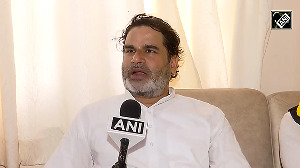The tech community, which was getting ready to use the ChatGPT fever and raise unlimited capital for their businesses, is going to face tougher obstacles now, predicts Ajit Balakrishnan.

The media frenzy that has been triggered by the announcement by a China-based company that its new artificial intelligence (AI) product, DeepSeek, is outperforming the American invention ChatGPT is deafening.
'China's AI Chatbot Dethrones ChatGPT!' said many headlines.
Some went further: 'DeepSeek shows AI's centre of power could shift away from the US,' says the BBC.
'DeepSeek AI raises national security concerns, US officials say,' says CBS News ... and so on.
You may well be justified in asking what all this frenzy is about and how a powerful country like the US can be threatened by the invention of a new software product.
For example, you may ask if people are worried because the DeepSeek app is free and open-source.
Then, you would most probably be told that DeepSeek can be free and open-source because the Chinese government must be secretly subsidising it and not telling the world.
Or you might ask, isn't the DeepSeek/ChatGPT challenge one of those many China-America contests like TikTok versus WhatsApp or the Baidu search engine versus Google Search?
Then, you will probably be told, do not worry, given the time, ChatGPT will outsmart DeepSeek like Google outsmarted Baidu.
The more tech-savvy of us will wonder, if ChatGPT-era AI was supposed to displace 85 million jobs by the end of 2025, including jobs like customer-service representatives, bank clerks, accountants, and teachers, what will this new thing, DeepSeek, do?
Because it is free, will it spread faster than ChatGPT and make these job displacements wider and deeper?
Or does the fact that DeepSeek is Chinese-owned mean that the Chinese government will use it for political ends in countries like India?
But I can see one thing for sure: The tech community, which was getting ready to use the ChatGPT fever and raise unlimited capital for their businesses, is going to face tougher obstacles now.
According to Reuters, 'On Monday, Nvidia lost about 17% or close to $593 billion in market value -- a record one-day loss for any company, while shares of companies in semiconductor, power, and infrastructure companies exposed to AI collectively shed more than $1 trillion.'
But what is more startling is this: The DeepSeek development team has said that it had spent less than $6 million on computing power to train the model -- a mere fraction of the multibillion dollar budgets enjoyed by OpenAI and others.
Also, compare this to the billions of dollars ChatGPT parent OpenAI has already raised and is said to be discussing raising an additional $6.5 billion from investors, and another $5 billion in debt from banks in the form of a revolving credit facility.
When I read and absorb all this, I can't help but reflect on my ongoing research about the history of past tech revolutions.
Take, for example, the textile industrial revolution, which is listed as having taken place in the Manchester area of Britain in the second half of the 18th century.
Classical history books credit this tech revolution as having been based on the invention of machines like James Hargreaves' spinning jenny, which could spin multiple threads at once; Richard Arkwright's water frame, the first powered textile machine; and others.
It is widely believed that machines like these helped Britain replace Indian handloom cotton textiles, which were flooding the British market at that time and being worn by even elite British women in London.
Incidentally, the women who were passionate about their Indian cotton-made dresses were called 'Calico Madams' because these initial imports were from Calicut, now called Kozhikode.
And, as I said, the conventional textbooks have told us that the invention of these textile machines in Britain not only helped stop the import of Indian cotton textiles and yarn but also helped British businessmen win a large part of the Indian domestic market.
The argument was that these machines made cotton spinning and weaving so much cheaper even though they were used by British labour, which was so much more expensive than Indian workers', because of the efficiency of these machines.
This was the underlying theory about 'technology' -- it saves labour costs and increases output manifold.
My research, which went into news reports and articles by individual scholars of that time (and not the official historians), the mid-18th century, tells me that the British government brought down Indian cotton imports by imposing a 40 to 70 per cent import duty on Indian cotton goods as the first step.
When even this did not allow them to compete with the quality and price of Indian cotton cloth and yarn, they resorted to growing cotton in America, using imported African slave labour.
It was these two factors which allowed them to match the prices and quality of Indian cotton goods.
My research is now driving me to other so-called tech revolutions like the one in indigo chemical synthesis, which led to Gandhiji's Champaran movement, and even more recent ones like electricity, automobiles, and electric power.
In each of these, like in the textile revolution, I am discovering that many social and legal variables led to their success and not just the power of 'inventions' and 'inventors'.
So, let's dive deep into all the variables (political, economic, and sociological) that are at play in the current revolutionary zeal about artificial intelligence.
It is important to decode what's at play here and make that knowledge widespread among our citizens and policymakers and not just be taken in by the headlines.
Ajit Balakrishnan is devoting his life to unravel the connection between society and technology.
Feature Presentation: Aslam Hunani/Rediff.com












